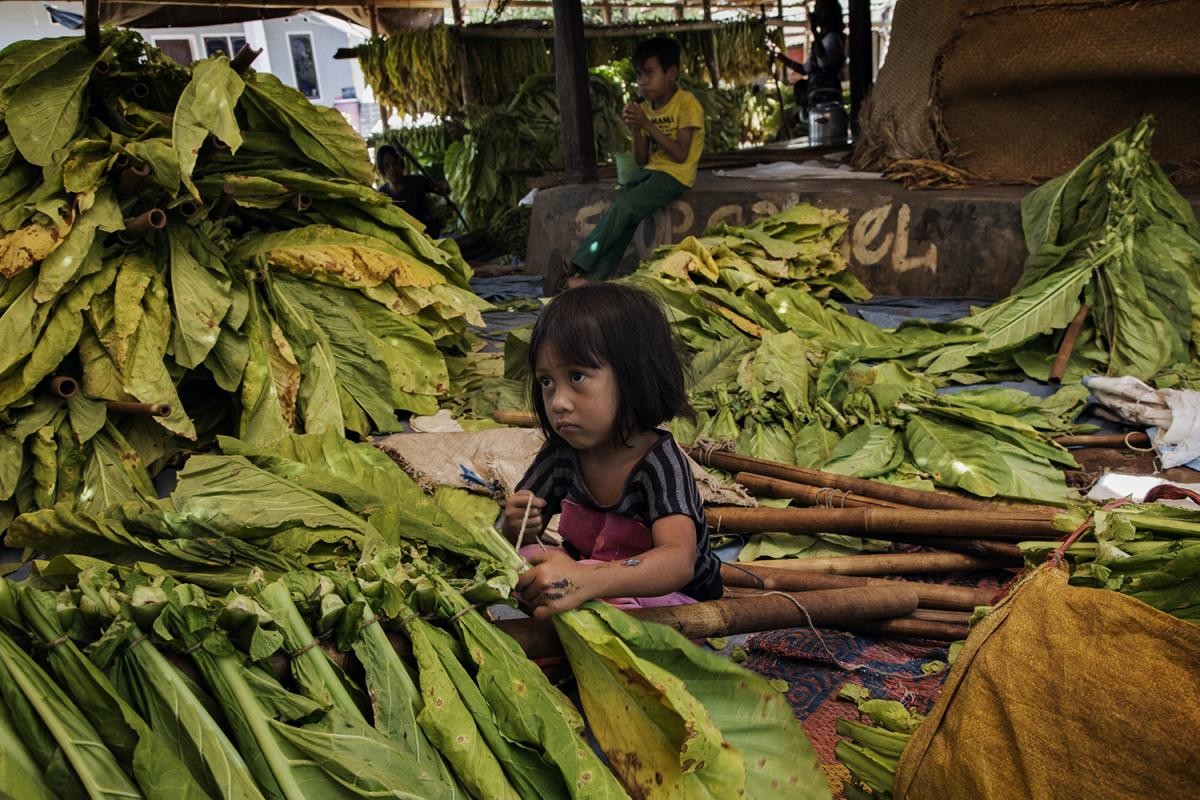Tobacco industry benefitting from child labor: Human Rights Watch
Change Size
 A young girl ties tobacco leaves onto sticks to prepare them for curing in East Lombok, West Nusa Tenggara.
(Photo Courtesy of Human Rights Watch/Marcus Bleasdale)
A young girl ties tobacco leaves onto sticks to prepare them for curing in East Lombok, West Nusa Tenggara.
(Photo Courtesy of Human Rights Watch/Marcus Bleasdale)
T
housands of children in Indonesia are being exposed to hazardous conditions on tobacco farms where they work as laborers, according to a report by Human Rights Watch (HRW) released on Wednesday, calling for the government to better protect minors.
In the 119-page report titled "'The Harvest is in My Blood': Hazardous Child Labor in Tobacco Farming in Indonesia", HRW lambaste Indonesian-based and multinational tobacco companies buying Indonesian-grown tobacco but do nothing significant to ensure child labor are not engaging in hazardous work on the farms of their supply chains.
The report documents how child workers, some just eight years old, are exposed to nicotine, handle toxic chemicals, use sharp tools, lift heavy loads and work in extreme heat, which all could have long-term consequences on their health and development.
The group urges tobacco firms to reject suppliers that use child labor involving direct contact with tobacco, as well as calls for government regulations that hold companies accountable for the involvement of children in the industry.
“Tobacco companies are making money off the backs and [at the expense of the] health of Indonesian child workers,” said Margaret Wurth, a HRW children’s rights researcher and co-author of the report.
“Tobacco companies shouldn’t contribute to the use of hazardous child labor through their supply chains.”
The report was based on field research in four provinces, including the three major-producing regions that make up almost 90 percent of the country’s annual tobacco production: East Java, Central Java, and West Nusa Tenggara.
HRW based the report on interviews with 227 people, including 132 child workers, ages 8 to 17. Half the children interviewed reported nausea, vomiting, headaches or dizziness, all symptoms consistent with acute nicotine poisoning from absorbing nicotine through their skin.
Thirteen-year-old "Ayu", not her real name, said she often vomits while harvesting tobacco with her family on farms in her village near Garut, West Java.
“I was throwing up [after being] so tired from harvesting and carrying the [tobacco] leaves. I threw up so many times," she said as quoted in the report.
Some of the children and the parents interviewed actually understood the health risks, still little precautions were taken. A massive education campaign is needed to promote awareness of the health risks to children working in the tobacco industry, the group says in the report.
Moreover, the report also found that most of the children worked outside of school hours while for some children, their work interfered with their schooling.
Under Indonesian law, 15 is the minimum age for work, and children aged 13 to 15 may only do light work that does not interfere with their schooling or harm their health and safety. Furthermore, the law also prohibits children under 18 from doing hazardous work, including in environments with harmful chemical substances.
Indonesia is the world’s fifth-largest tobacco producer, with more than 500,000 tobacco farms. The International Labor Organization (ILO) estimates that more than 1.5 million children, aged from 10 to 17, work in agriculture in Indonesia. However, the ILO had no official estimates on the number of children working in the tobacco industry.
Under human rights norms, tobacco companies had a responsibility to ensure that the tobacco they purchase was not produced with hazardous child labor, HRW said.
Indonesia is the only ASEAN country not to have ratified the World Health Organization’s Framework Convention on Tobacco Control, a global public-health treaty aimed at protecting the population from the consequences of tobacco consumption and exposure to tobacco smoke. (vps/rin)









